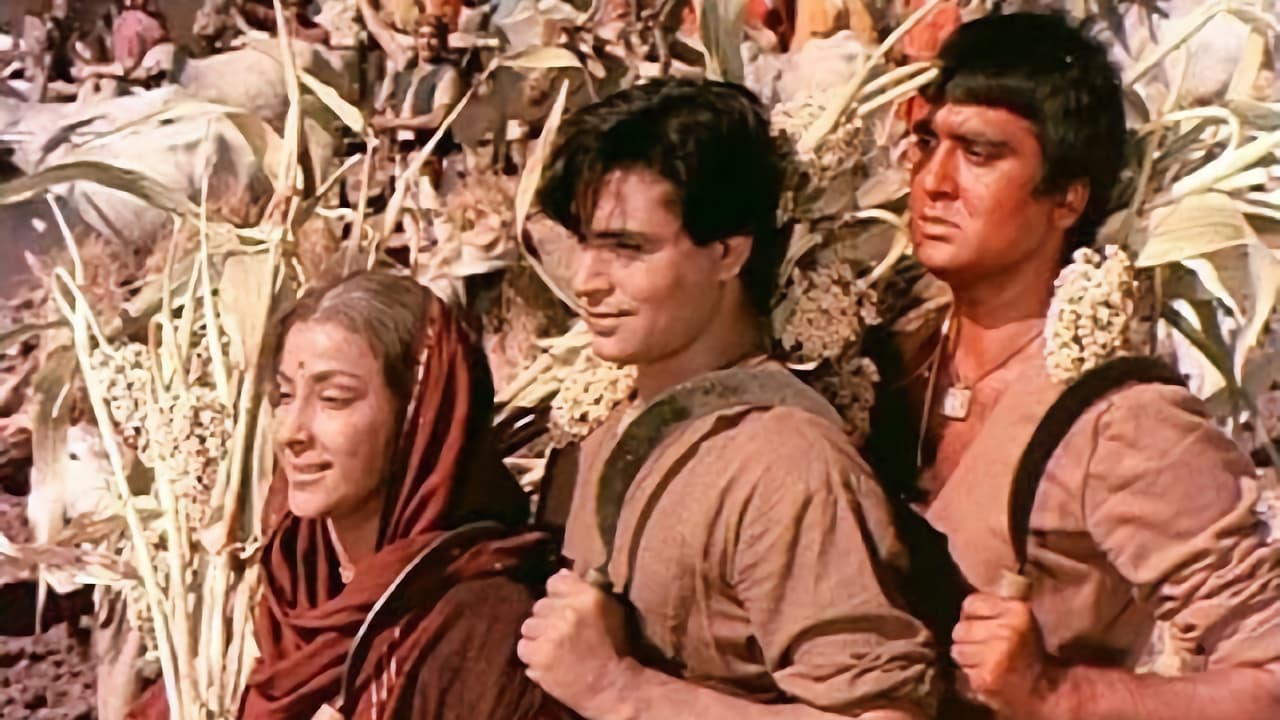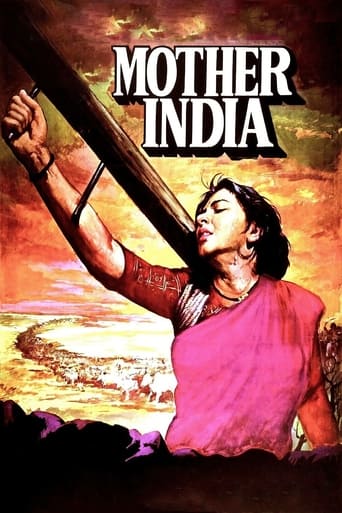



If you're interested in the topic at hand, you should just watch it and judge yourself because the reviews have gone very biased by people that didn't even watch it and just hate (or love) the creator. I liked it, it was well written, narrated, and directed and it was about a topic that interests me.
View MoreThe joyful confection is coated in a sparkly gloss, bright enough to gleam from the darkest, most cynical corners.
View MoreI think this is a new genre that they're all sort of working their way through it and haven't got all the kinks worked out yet but it's a genre that works for me.
View MoreThe film's masterful storytelling did its job. The message was clear. No need to overdo.
View MoreMother India is a wonderful natural and educational story of Indian life ethics and culture. It is enjoyed throughout many countries, and is a family favorite, not only in India, but I am told throughout the Arab world, and other Asian counties. The film is quite long, and a little slow to get started for many people who are used to just 90 minute films, but if you stick with it you will be rewarded with a brilliant insight into life as it was in India. In subtle ways it gives it takes you through, what virtues and values are important to people from another culture. Some wonderful cinematography that really does create an atmosphere of old India.If you know nothing of Asian cultures, then this is one film that I would say that all people from the west should watch if they want to understand Asia and the values of its people, as they were nearly 100 years ago, and in many ways the values that those communities who live among you in the west, have inherited from their parents who migrated to the west during that time.You have to be a little understanding, but it is a truly heartwarming film, one for a romantic educational night in with your nearest and dearest I would say.
View MoreAny foreign film, in this case Indian, that features in the book 1001 Movies You Must See Before You Die, is obviously one I will see. Basically 'mother' of the village Radha (Nargis) opens the canal, and goes into a flashback to the past where she was newly married to husband Shamu (Raaj Kumar), with the wedding paid for by her mother in law, with money lent by Sukhilala (Kanhaiyalal). This money lending begins a spiral of poverty and tragedy, including forced payment, and Shamu having his arms crushed by a boulder, forcing him to leave the village and never return. After this, Radha's mother in law dies, while she continues to work in the fields, and gives birth to another child, and she refuses more help from Sukhilala. A storm goes through the village, killing Radha's youngest child, and destroying most of the villagers homes, but everyone stays to rebuild. It then moves to a few years later, where Radha's two surviving children, Birju (Sunil Dutt) and Ramu (Rajendra Kumar) have grown up to be young men. Ramu is fine, but Birju is a bad tempered son taking all his frustrations on village girls, especially Sukhilala's daughter. Ramu has a much softer temper, and manages to get married and become a father, but also manages to get his family in the cycle of poverty. Birju however gets to the point where his temper is becoming dangerous, attacking Sukhilala, his daughter and other family members, and he wants revenge when it is the daughter's wedding day. Radha promises Birju would never come to harm, despite knowing how dangerous he has become, but after he kills Sukhilala and the daughter, she has no choice but to shoot him. This is where the film returns to the present day, seeing Radha see the newly opened canal river run red like blood. Also starring Kumkum as Champa. The performances by Nargis as the devoted mother and Dutt as the violent son are very well done, there may not be much realism in the situations portrayed, but with some likable songs and the spectacle, this is a worthwhile drama. It was nominated the Oscar for Best Foreign Language Film. Very good!
View MoreMehboob Khan's Mother India reserves a special place among all time great and memorable Mega Hit films. Nargis has consummately performed a versatile role of a mature Indian mother who would not allow her own son to rob the honor of their village at any cost. The climactic last scene of the epic, where Radha shoots her son in the back, while Birju was all set to kidnap the cruel money lender's daughter is a tragedy sequence that can be commensurately compared with the ending of another emotionally charged film - Shakti, where Dilip Kumar shoots in the back of his son "Amitabh".However, Birju's angry performance in this movie steals the show at many a times; for instance, when he argues with his mother and brother about the greedy Bania moneylender who had fleeced their family from all earthly possessions through the odiously manipulative annual interest rate charged by him, although they have toiled day and night to return the debt.It is a great melodramatic picture, containing magnificent performance by Nargis and Sunil Dutt, while manifesting the impoverished economic conditions and abysmal living standards of a typical Indian rural family who were driven in utter disgust, shame and tragedy due to the volatile temper of one of their family members. However, seething poverty was not the sole reason which perturbed Birju (Sunil Dutt) to become an outlaw and murder Sukhi Lala (the rapacious money lender), but the very ominous and cruel person hidden in the money lender, who, in a backward rural social setup took full benefit/advantage of the poor, illiterate and weak elements of village social order.Besides, the strong and moving story line, Faredoon has captured mesmerizing stills providing an excellent background setting of the full horizon picture down to the ground level with spreading murky clouds at dusk against the backdrop of silhouetted actors.It is definitely a must see movie having marvelous and stupendous cinematography, as well.
View MoreNargis stars as a suffering woman, Radha, experiencing tragedy after tragedy, surviving it all. The first half of the film doesn't promise anything overly special. A poor community falls under the weight of a moneylender, Sukhilala. When Radha marries, her mother-in-law mortgages her farm to pay for the wedding and Radha's jewlery. Since the mother-in-law has no education whatsoever, Sukhilala, probably the only educated man in the village, is able to take advantage of her. When she challenges Sukhilala's claim, she can't do much to disprove their deal. This part of the story is pretty cliché, rather predictable and very questionable. Sukhilala is a fairly standard villain, very cartoonish and simplistic. The audience is programmed to hiss at his every appearance. The conflict is compelling, but I was hoping for something more complex. It is nice, I suppose, to see the system challenged, but the fact that the system is challenged does not necessarily mean that the film challenges the system in an insightful manner. In reality, the film's solutions to the problems are all melodramatics.Luckily, something else is brewing in the film at this point. Radha has two sons, Ramu and Birju. The story starts to focus in on Birju, who is very obnoxious. His mother loves him dearly, spoils him, and he becomes simply evil. I should say at this point that the little kid who plays him as a child, Master Sajid, is very, very annoying, not to mention a terrible little actor. As an adult, Birju is a devil. Sukhilala still runs the place, and now Birju is big enough to do something about it. Thankfully, Birju is not made a hero. Well, perhaps an anti-hero, but at least we're spared him becoming an Indian Robin Hood as I expected. Complexities begin to develop in the way Sukhilala is depicted, and, while he's still the villain, the audience is no longer programmed to despise him on site. Radha has to both protect her son and stand up for what is right. The climax is so extremely impressive that I was almost convinced that the film was great.Yet the film is not what I would call great as a whole. There were dozens of scenes that I loved, but, as the film goes on for three hours, there was plenty to dislike, as well. The fat and gristle detract. Did I mention there are great songs? Great indeed! I love Hindi music myself. The cinematography is also often exceptional. 8/10.
View More